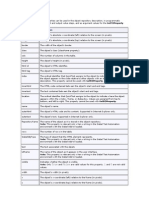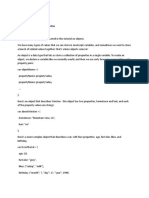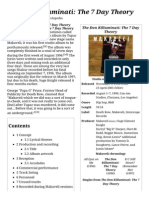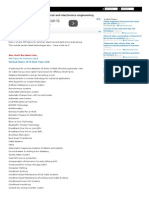0 ratings0% found this document useful (0 votes)
90 views37-Create Own Objects
Objects in JavaScript can be used to organize information by grouping related properties and methods. There are two main ways to create objects - directly instantiating an object with the new operator, or using a constructor function to define a template for similar objects. Properties are values associated with an object, while methods are actions that can be performed on an object. Properties and methods are accessed using dot notation on the object name.
Uploaded by
BaneeIshaqueKCopyright
© © All Rights Reserved
Available Formats
Download as DOC, PDF, TXT or read online on Scribd
0 ratings0% found this document useful (0 votes)
90 views37-Create Own Objects
Objects in JavaScript can be used to organize information by grouping related properties and methods. There are two main ways to create objects - directly instantiating an object with the new operator, or using a constructor function to define a template for similar objects. Properties are values associated with an object, while methods are actions that can be performed on an object. Properties and methods are accessed using dot notation on the object name.
Uploaded by
BaneeIshaqueKCopyright
© © All Rights Reserved
Available Formats
Download as DOC, PDF, TXT or read online on Scribd
You are on page 1/ 3
JavaScript Create Your Own Objects
Objects are useful to organize information.
Try it Yourself - Eamples
Create a !irect instance of an object
Create a template for an object
JavaScript Objects
Earlier in t"is tutorial we "ave seen t"at JavaScript "as several built-in objects# li$e String# %ate#
&rray# an! more. 'n a!!ition to t"ese built-in objects# you can also create your own.
&n object is just a special $in! of !ata# wit" a collection of properties an! met"o!s.
(et)s illustrate wit" an eample* & person is an object. +roperties are t"e values associate! wit" t"e
object. T"e persons) properties inclu!e name# "eig"t# weig"t# age# s$in tone# eye color# etc. &ll
persons "ave t"ese properties# but t"e values of t"ose properties will !iffer from person to person.
Objects also "ave met"o!s. ,et"o!s are t"e actions t"at can be performe! on objects. T"e persons)
met"o!s coul! be eat-.# sleep-.# wor$-.# play-.# etc.
+roperties
T"e synta for accessing a property of an object is*
objName.propName
You can a!! properties to an object by simply giving it a value. &ssume t"at t"e personObj alrea!y
eists - you can give it properties name! firstname# lastname# age# an! eyecolor as follows*
personObj.firstname="John";
personObj.lastname="Doe";
personObj.age=30;
personObj.eyecolor="blue";
document.writepersonObj.firstname!;
T"e co!e above will generate t"e following output*
John
,et"o!s
&n object can also contain met"o!s.
You can call a met"o! wit" t"e following synta*
objName.methodName!
Note: +arameters re/uire! for t"e met"o! can be passe! between t"e parent"eses.
To call a met"o! calle! sleep-. for t"e personObj*
personObj.sleep!;
Creating Your Own Objects
T"ere are !ifferent ways to create a new object*
1. Create a direct instance of an object
T"e following co!e creates an instance of an object an! a!!s four properties to it*
personObj=new Object!;
personObj.firstname="John";
personObj.lastname="Doe";
personObj.age=#0;
personObj.eyecolor="blue";
&!!ing a met"o! to t"e personObj is also simple. T"e following co!e a!!s a met"o! calle! eat-. to
t"e personObj*
personObj.eat=eat;
2. Create a template of an object
T"e template !efines t"e structure of an object*
function personfirstname$lastname$age$eyecolor!
%
this.firstname=firstname;
this.lastname=lastname;
this.age=age;
this.eyecolor=eyecolor;
&
0otice t"at t"e template is just a function. 'nsi!e t"e function you nee! to assign t"ings to
t"is.property0ame. T"e reason for all t"e 1t"is1 stuff is t"at you)re going to "ave more t"an one
person at a time -w"ic" person you)re !ealing wit" must be clear.. T"at)s w"at 1t"is1 is* t"e
instance of t"e object at "an!.
Once you "ave t"e template# you can create new instances of t"e object# li$e t"is*
my'ather=new person"John"$"Doe"$#0$"blue"!; my(other=new
person")ally"$"*ally"$+,$"green"!;
You can also a!! some met"o!s to t"e person object. T"is is also !one insi!e t"e template*
function personfirstname$lastname$age$eyecolor!
%
this.firstname=firstname;
this.lastname=lastname;
this.age=age;
this.eyecolor=eyecolor;
this.newlastname=newlastname;
&
0ote t"at met"o!s are just functions attac"e! to objects. T"en we will "ave to write t"e
newlastname-. function*
function newlastnamenew-lastname!
%
this.lastname=new-lastname;
&
T"e newlastname-. function !efines t"e person)s new last name an! assigns t"at to t"e person.
JavaScript $nows w"ic" person you)re tal$ing about by using 1t"is.1. So# now you can write*
my,ot"er.newlastname-1%oe1..
You might also like
- JavaScript Prototype and Prototype ChainNo ratings yetJavaScript Prototype and Prototype Chain25 pages
- Stanford CS193p: Developing Applications For iOS! Fall 2013-14No ratings yetStanford CS193p: Developing Applications For iOS! Fall 2013-1472 pages
- Constructivist Learning and Virtual WorldsNo ratings yetConstructivist Learning and Virtual Worlds16 pages
- Your Project MUST Include All of The Following Information:: Element Project-7 Grade ScienceNo ratings yetYour Project MUST Include All of The Following Information:: Element Project-7 Grade Science3 pages
- Snc1de Element Cereal Box Assignment 02 18 20No ratings yetSnc1de Element Cereal Box Assignment 02 18 204 pages
- E C F I - G G !: Book Reation OR Lliterate Hostwriters OldmineNo ratings yetE C F I - G G !: Book Reation OR Lliterate Hostwriters Oldmine76 pages
- OOP 2. Data - Student Class: One Class Per File Is Standard PracticeNo ratings yetOOP 2. Data - Student Class: One Class Per File Is Standard Practice5 pages
- Chapter 7 - JavaScript Functions, Events and LoopsNo ratings yetChapter 7 - JavaScript Functions, Events and Loops50 pages
- Abstraction. Classes, objects and instancesNo ratings yetAbstraction. Classes, objects and instances4 pages
- Tema Anuala: Tema Proiectului: Categoria de Activitate: Centre de InteresNo ratings yetTema Anuala: Tema Proiectului: Categoria de Activitate: Centre de Interes9 pages
- Two Types Intrinsic and Extrinsic. The Object With Intrinsic State Is Called Flyweight Object. When We Implement Flyweight We CreateNo ratings yetTwo Types Intrinsic and Extrinsic. The Object With Intrinsic State Is Called Flyweight Object. When We Implement Flyweight We Create2 pages
- Microsoft Word Project Ideas: 1. Poster (8 X 11)0% (1)Microsoft Word Project Ideas: 1. Poster (8 X 11)6 pages
- 101 Things To Do Before You Die (Personal Excellence) Please Share Thank YouNo ratings yet101 Things To Do Before You Die (Personal Excellence) Please Share Thank You17 pages
- Getting Started in LSL Scripting in Second LifeNo ratings yetGetting Started in LSL Scripting in Second Life8 pages
- 2007: Sept Bahagian A 1. TWO (2) Characteristics of An Effective Goal. (2 Marks)No ratings yet2007: Sept Bahagian A 1. TWO (2) Characteristics of An Effective Goal. (2 Marks)14 pages
- Lesson Plan #2: Collaboration: Grade: 1st Social Studies Strand: Places and RegionsNo ratings yetLesson Plan #2: Collaboration: Grade: 1st Social Studies Strand: Places and Regions6 pages
- Cs193P - Lecture 3: Iphone Application DevelopmentNo ratings yetCs193P - Lecture 3: Iphone Application Development74 pages
- Artificial Brilliance Crafting Jewelry Inspired by the MastersFrom EverandArtificial Brilliance Crafting Jewelry Inspired by the MastersNo ratings yet
- Artificial Brilliance: Crafting Jewelry Inspired by the Masters: From Inspiration to Creation: How AI is Transforming Jewelry DesignFrom EverandArtificial Brilliance: Crafting Jewelry Inspired by the Masters: From Inspiration to Creation: How AI is Transforming Jewelry DesignNo ratings yet
- How to Build a Hovercraft: Air Cannons, Magnetic Motos, and 25 Other Amazing DIY Science ProjectsFrom EverandHow to Build a Hovercraft: Air Cannons, Magnetic Motos, and 25 Other Amazing DIY Science ProjectsNo ratings yet
- The Ready Maker Handbook: Imagining the World Through SoftwareFrom EverandThe Ready Maker Handbook: Imagining the World Through SoftwareNo ratings yet
- Me Against The World - Wikipedia, The Free EncyclopediaNo ratings yetMe Against The World - Wikipedia, The Free Encyclopedia9 pages
- Pac's Life - Wikipedia, The Free EncyclopediaNo ratings yetPac's Life - Wikipedia, The Free Encyclopedia5 pages
- The Don Killuminati The 7 Day Theory - Wikipedia, The Free EncyclopediaNo ratings yetThe Don Killuminati The 7 Day Theory - Wikipedia, The Free Encyclopedia12 pages
- Until The End of Time (Tupac Shakur Album) - Wikipedia, The Free EncyclopediaNo ratings yetUntil The End of Time (Tupac Shakur Album) - Wikipedia, The Free Encyclopedia7 pages
- Problem in Conventoinal Tyre: Portmanteau Tyre French Michelin Polyurethane SpokesNo ratings yetProblem in Conventoinal Tyre: Portmanteau Tyre French Michelin Polyurethane Spokes12 pages
- 499 Topics For Seminars Electrical and Electronics Engineering - Electrical Engineering PDFNo ratings yet499 Topics For Seminars Electrical and Electronics Engineering - Electrical Engineering PDF11 pages
- Robot Motors & Sensors Used in Robots: TopicNo ratings yetRobot Motors & Sensors Used in Robots: Topic1 page
- A Simple Implementation of Outlook Style Groupbox Control With Transparency SupportNo ratings yetA Simple Implementation of Outlook Style Groupbox Control With Transparency Support3 pages
- Vishveshwaraiah Technological University: A Seminar Report On Blue Eyes TechnologyNo ratings yetVishveshwaraiah Technological University: A Seminar Report On Blue Eyes Technology18 pages
- Poljoindustries: Gandhigram Road, Mullakkad, P.O.Irinjalakuda-680121 Phno:0480-2825064,2826064 Tel Fax-0480-2827004No ratings yetPoljoindustries: Gandhigram Road, Mullakkad, P.O.Irinjalakuda-680121 Phno:0480-2825064,2826064 Tel Fax-0480-28270044 pages
- Department of Technical Education: Diploma in EngineeringNo ratings yetDepartment of Technical Education: Diploma in Engineering1 page
- Flexible Display: Flexible OLED-based DisplaysNo ratings yetFlexible Display: Flexible OLED-based Displays2 pages
- Ajol File Journals - 30 - Articles - 250010 - Submission - Proof - 250010 349 597593 1 10 20230627No ratings yetAjol File Journals - 30 - Articles - 250010 - Submission - Proof - 250010 349 597593 1 10 2023062725 pages
- Lms Activity 3 Two-Storey Residential House Magaddon, Engel A. Ground Floor PlanNo ratings yetLms Activity 3 Two-Storey Residential House Magaddon, Engel A. Ground Floor Plan1 page
- Almeida Theatre Production of Homecoming by PinterNo ratings yetAlmeida Theatre Production of Homecoming by Pinter34 pages
- A Numerical Investigation of Solid Particle Erosion Experienced Within Oilfield Control ValvesNo ratings yetA Numerical Investigation of Solid Particle Erosion Experienced Within Oilfield Control Valves10 pages
- Practical Guide To Evil Jumpchain UpdatedNo ratings yetPractical Guide To Evil Jumpchain Updated15 pages
- 10 9MA0 01 9MA0 02 A Level Pure Mathematics Practice Set 10No ratings yet10 9MA0 01 9MA0 02 A Level Pure Mathematics Practice Set 105 pages
- Socialkenny Pua Wordpresscom - 59f458c01723dda01584f408100% (1)Socialkenny Pua Wordpresscom - 59f458c01723dda01584f40828 pages
- Military-Grade Fabric Resists Large Rips: PPE E ENo ratings yetMilitary-Grade Fabric Resists Large Rips: PPE E E2 pages
- Present Simple or Present Continuous 2018No ratings yetPresent Simple or Present Continuous 20181 page
- Chapter One: Thesis Report On Electrical Safety Assessment System of SQ Celsius Limited100% (2)Chapter One: Thesis Report On Electrical Safety Assessment System of SQ Celsius Limited99 pages












































































































